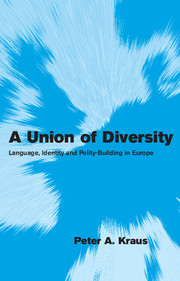Book contents
- Frontmatter
- Contents
- List of Tables and Figure
- Preface
- Acknowledgments
- A Union of Diversity
- 1 Introduction: The dynamics of European integration
- 2 The European Union's democratic deficit and the search for a European demos
- 3 The identity of a multinational polity
- 4 Language and politics: A challenge for Europe
- 5 The language question in the institutional complex of the European Union
- 6 Political communication in the transnational civil society
- 7 Recognition, self-determination and integration in a union of diversity
- References
- Index
- Titles in the series
2 - The European Union's democratic deficit and the search for a European demos
Published online by Cambridge University Press: 22 September 2009
- Frontmatter
- Contents
- List of Tables and Figure
- Preface
- Acknowledgments
- A Union of Diversity
- 1 Introduction: The dynamics of European integration
- 2 The European Union's democratic deficit and the search for a European demos
- 3 The identity of a multinational polity
- 4 Language and politics: A challenge for Europe
- 5 The language question in the institutional complex of the European Union
- 6 Political communication in the transnational civil society
- 7 Recognition, self-determination and integration in a union of diversity
- References
- Index
- Titles in the series
Summary
After Maastricht, there was increasing evidence that the permissive consensus which formerly sustained the European project had become fragile. Those who advocated a deepening of the Union faced considerable resistance. This was due in the first place to the successful mobilization of Euro-sceptical or anti-European political forces. The European Union (EU) became a preferred target of right-wing populist groups in several member states. It had to confront a growing antipathy on the part of important sectors of the established right as well, who considered that existential national interests would be endangered in the European polity. At the same time, parts of the socialist and social-democratic European left felt more and more uncomfortable in view of the dominant position that untamed market liberalism had attained in the formation of the Economic and Monetary Union. The manifestations of discontent towards the EU appeared to be particularly strong within the political spectrum of recent adherents such as Austria and Sweden. In the first case, they were concentrated on the right; in the second, on the left.
Moreover, the situation after Maastricht was marked by a silent crumbling of the diffuse support which the bulk of the public in almost all member states had shown for the EU over a long period of time. According to the Eurobarometer surveys regularly conducted for the European Commission, it seemed that, with the increasing politicization of European affairs, the proportion of Euro-sceptical citizens was increasing too.
- Type
- Chapter
- Information
- A Union of DiversityLanguage, Identity and Polity-Building in Europe, pp. 13 - 36Publisher: Cambridge University PressPrint publication year: 2008



